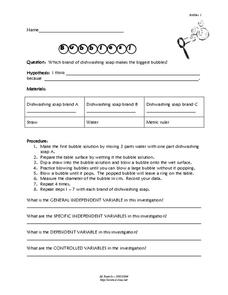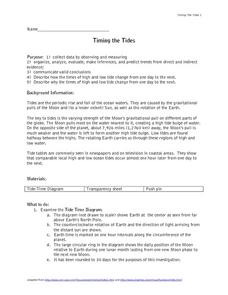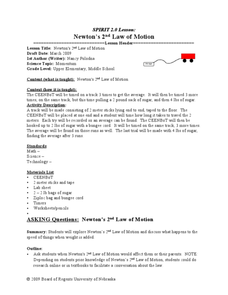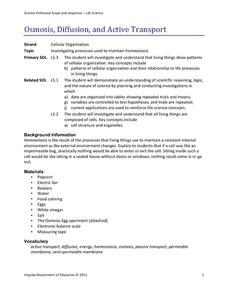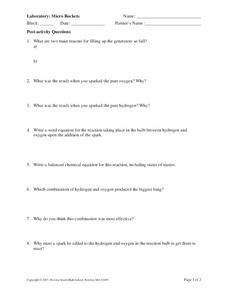PHET
Planet Designer: What’s Trending Hot?
Excite scholars to design their own planet in this first of five lessons. The instructional activity starts with a pre-activity assessment, a complete lesson plan that is easy to implement, and a post-activity assessment that would look...
Curated OER
Who Dirtied The Water/Clean Water: Is It Drinkable?
Students enter the room, receive a film canister that contains materials that be added to the dirty water bell jar. They record on their data table who or what is doing the adding and the actual substance that has been added to the bell...
Curated OER
Buoyancy-Why Things Float
In this buoyancy worksheet, students read about the principles behind objects floating including density, buoyancy and Archimedes' Principle. Students complete a buoyancy lab where they use a balloon and water and a film canister and...
Curated OER
Atmosphere
This is a very basic presentation of the layers of the atmosphere. It divides the atmosphere into four layers and pretty much only mentions the elevation and order of each. The last of seven slides shows a pie graph and data table of the...
Curated OER
Human Activity and the Environment
Students review and analyze graphs and tables as a group. They develop their graph and data analysis skills by converting data tables from Human Activity and the Environment into graphs.
Curated OER
The Rock Cycle
In this rock cycle activity, students copy the table illustrated for data and observations of rock samples. Then they examine the rock samples observing the characteristics and the arrangement of grains in each. Students then record...
Curated OER
Bubbles
Young scholars experiment bubbles. In this scientific method lesson, students identify variables used in proper experiment design. Young scholars conduct experiments with different brands of dish-washing detergent to determine which...
Virginia Department of Education
Solution Concentrations
What happens when you combine 6.022 times 10 to the 23 piles of dirt into one? You make a mountain out of a mole hill. Scholars use dehydration to obtain percent composition and then calculate the molarity of the original solution.
Curated OER
Nuclear Chemistry Homework Problem Set
In this nuclear chemistry worksheet, students evaluate data from concentration experiments on radioactive iodine. They graph the data, determine radioactive decay and half life for the element.
Curated OER
Ocean Waves and Tides
In this tides worksheet, students will use a tide chart to plot 15 data points onto a graph. Students will be looking at high tides and low tides and comparing the ranges. This worksheet has 2 short answer questions.
Virginia Department of Education
Planet Line-Ups
Should Pluto be considered a planet or a dwarf planet? Scholars research planets in our solar system to understand their similarities and differences. It also includes memory activities related to the order of the planets.
Curated OER
Ocean Water
Given data about the composition of ocean water, students complete 5 different questions using a provded table that relate to the ocean water (with elements Chloride, Sodium, Sulfate, and Magnesium). Some questions require calculation,...
Curated OER
Human Heredity II
Using deductive skills and reasoning based on the data provided about a family's blood genotype, blood phenotype, chromosomes, and genetic conditions, 9th graders answer the questions below. The conditions discussed are Down Syndrome and...
Curated OER
Timing the Tides
Students collect data and describe how and why the high and low tides change from day to day. In exploring tides activity students study tides by taking notes, recording data and analyzing their findings.
Virginia Department of Education
Predator-Prey Simulation
Do your pupils have the misconception that environmental predators are "bad" and harm smaller creatures? The simulation explains, in detail, the important role predators play in maintaining a stable ecosystem. Through web-based research,...
Curated OER
Newton's 2nd Law of Motion
Students investigate how mass affects the speed of an object. In this physics lesson, students record data on the data table and graph results. They analyze findings and formulate a conclusion.
Virginia Department of Education
Molar Volume of a Gas
What is a chemist's favorite plant? Stoichiome Tree! Scholars produce hydrogen gas by reacting magnesium with hydrochloric acid. Then they calculate the molar volume of the gas produced before answering assessment questions.
Curated OER
Bacteria in Your Life
In this bacteria learning exercise, students conduct an experiment by looking through their cupboard and refrigerator at home and locating the expiration date on six foods. Then they record what they found in the table shown. Students...
Curated OER
Evolution of Stars
In this stars worksheet, students classify stars by comparing their surface temperatures and absolute magnitude. Students fill in 24 blanks in a data table.
Virginia Department of Education
Osmosis, Diffusion, and Active Transport
No, it really is okay to play with your food! Emerging scientists manipulate popcorn, eggs, and other household objects as they demonstrate multiple cellular processes. The activity, capable of modifications, is designed to reflect the...
Curated OER
Comparing Minibeasts
For this "Comparing Minibeasts Data Worksheet", students respond to four short answer, one drawing, and eight graphic organizer questions.
Curated OER
Laboratory: Micro Rockets
If you know how to employ the exothermic reaction between hydrogen gas and oxygen gas to make a miniature rocket, then this worksheet is a fabulous lab sheet for your chemistry charges. First, they observe a spark in pure oxygen and one...
Curated OER
Lake Pepperidge Farm
Students calculate proportions to determine the total population of Lake Pepperidge Farm. They collect a blind sample of fish and count the number of tagged and untagged fish. They collect data from all samples and record the data in a...
Curated OER
Evidence for Hydrogen Bonds
In this hydrogen bonds worksheet, students use three data tables showing the boiling points for various compounds containing hydrogen to create three graphs for comparison.








